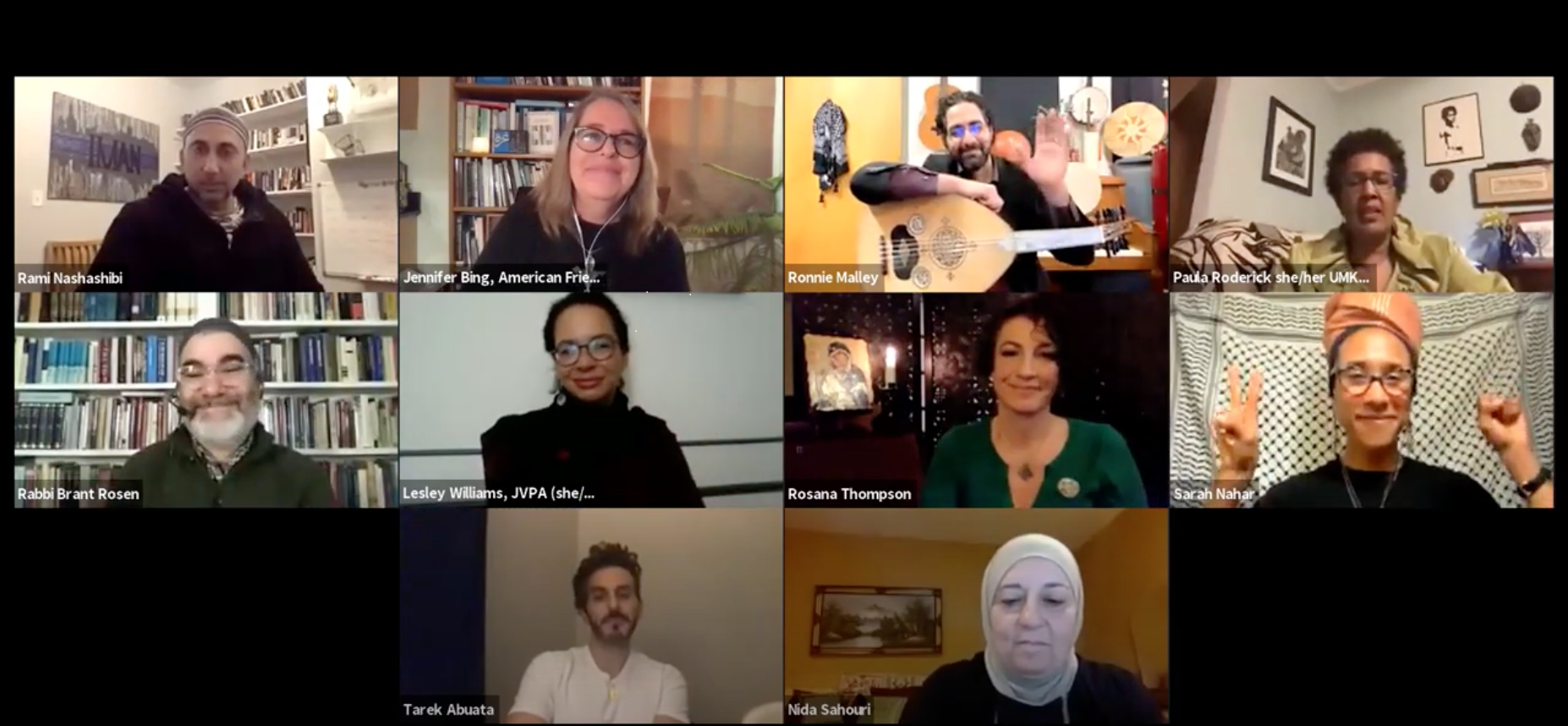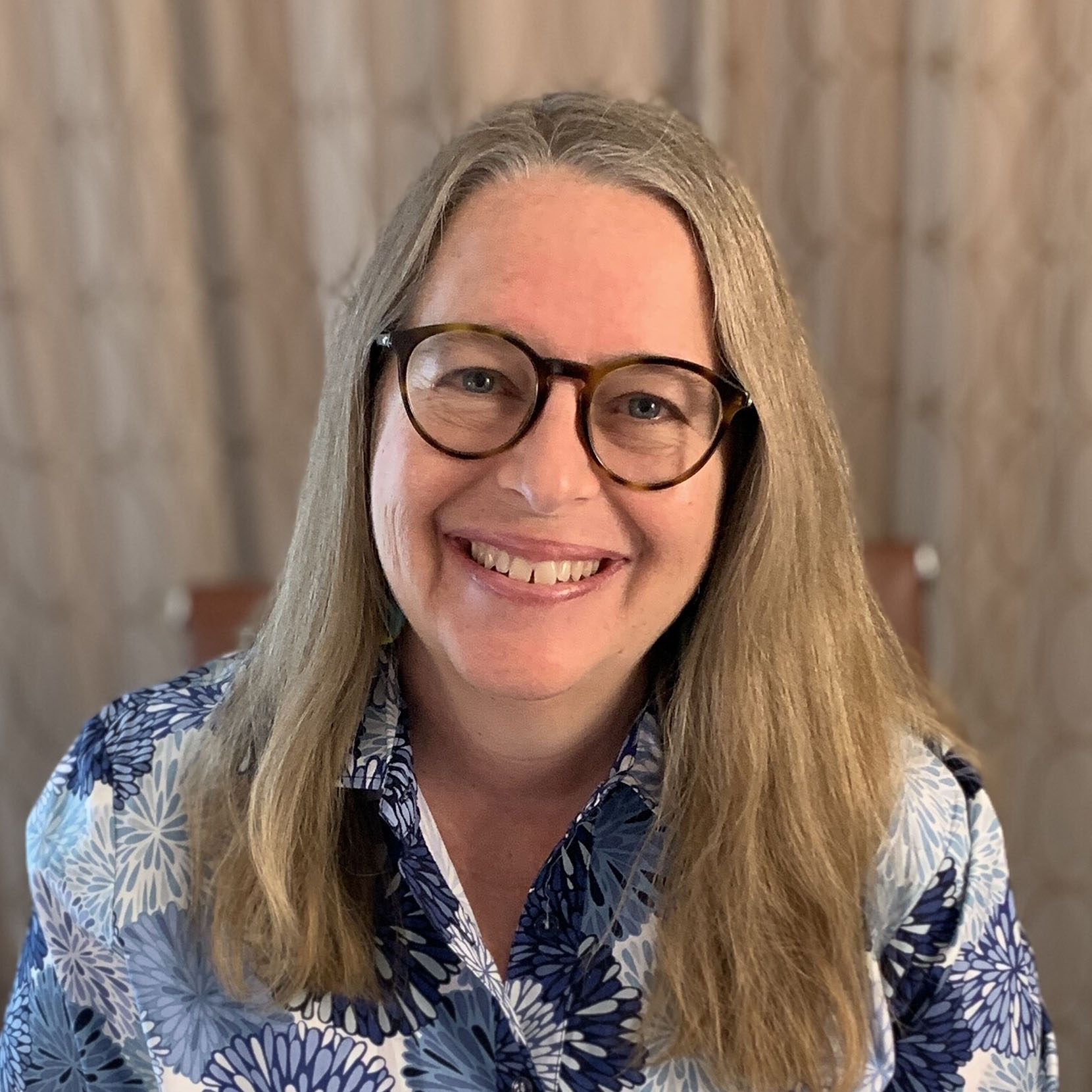
Palestine Interfaith Service Jennifer Bing / AFSC
On November 29, the U.N. International Day in Solidarity with the Palestinian People, we hosted an interfaith service organized by AFSC and the Chicago Faith Coalition on Middle East policy. People of all faith traditions joined from all across the country to hear words of inspiration, music and prayers to nurture hope in solidarity with Palestine.
Our program began with an Abrahamic medley by Palestinian oud musician Ronnie Malley, followed by messages of solidarity from Christian, Muslim, and Jewish traditions. Palestinians from Gaza, Bethlehem, the Galilee, and the U.S. shared words of encouragement and gratitude for solidarity even in the midst of global challenges. A call to act in support of UNRWA (United Nations Relief and Works Agency) and its care for refugees (facing a crisis due to funding cuts by the U.S. administration) was made to express our faith in action.
May your spirits be uplifted and your commitment deepened as you watch these excerpts from our musicians and speakers from our service.
Palestinian musician, actor, and educator Ronnie Malley performs an Abrahamic medley: Yedid Nefesh (Beloved of the Soul) - Jewish piyyut, Ahmedou a'Rab (Praise the Lord) - Psalm (Mizmor) 117, Ya Imam a'Rusli (Imam of the messengers) – Nasheed
Rev. Dr. Waltrina Middleton, preacher, poet, and the executive director of the Community Renewal Society in Chicago, reflects on her visit to Palestine and conversation with a young Palestinian boy. “I begin with a simple question, what if you had no sky? Or if the only evidence of one offers no sunshine, but the heaviness of oppression, and the cloud of smoke from tear gas and other chemical weapons used to reduce your humanity -- in the words of what Dr. King calls nobodyness…. Christ was a peacemaker and disrupter of unjust societies. Christ taught us that your liberation is our liberation. Therefore, your suffering is our lament. We have no sky is a simple litany lament calling us as people of faith to take action. May all of God’s children know the hope and witness of seeing a sky.”
The Rev. Dr. Mitri Raheb, Founder/President of Dar al Kalima University in Bethlehem and the co-founder of the Bright Stars of Bethlehem, brings a message from the “double lockdown” of the pandemic and Israeli occupation. “Your gathering today in solidarity with Palestine gives us so much hope that we are not alone in this fight. So much hope that we have Christians, Muslims, and Jews working together to end the Israeli occupation and to see a day when we all can breathe and experience our full humanity.”
Leah Shoshanah, a singer/songwriter/educator and the Cantorial Soloist for the congregation Tzedek Chicago, sings a version of the kaddish (a Jewish prayer to remember those who have passed), honoring all those who have been taken unjustly by hate, by violence, and by corruption. “My lyrics speak to our solidarity as people of this earth in mourning and remembering of these lost ones. And my lyrics speak to our resilience, our power and our ability as we continue our work in Tikkun Olam, the healing of the world.
Imam Abdul Malik Muhajid, the Founding President of Sound Vision, executive producer of the talk-show program Radio Islam and former Chairman of the Council for a Parliament of the World’s Religions, shares, “There is one word that captures the essence of all Islamic laws and Islamic teachings. That one word describes the overriding value that permeates all Islamic values. Justice. That word is justice.”
Ahmed Abu Artema, an independent writer, social-media and peace activist based in Rafah, Gaza, shares some of his insights on solidarity gained on a recent tour in the U.S. sponsored by AFSC. “We are one family. All of us share the same goal, how to struggle to make the world more just and have dignity for all humans. This is our common goal. Yes, it is not easy, and there are many challenges. But as Nelson Mandela said, ‘It is a long walk for freedom.’ When we are together, we have more hope, more strength, and we can continue.”
Sarah Nahar, a spiritual activist, community cultivator, and ecological thinker shares her thoughts and a collective prayer for solidarity. “May our remembering of who we are really be a compass for collective healing…. From Palestine to here, a collective prayer to be unsettled… May we be unsettled, may we stop settling for disconnection, for zoning out, for corporate numbing, for forgetting. May we become unsettled in society that tells us to settle down. While at home in our bodies, may we stay unsettled by the stories that we hear of the abuse of slavery, genocide, ecocide.”
Rae Abileah, a social change strategist, author, editor, ritual facilitator, and ordained Kohenet, read from the book of Ruth 1:16. “Ruth pledges herself to Naomi with these words. Wherever you go, I will go. Wherever you lodge, I will lodge. Your people shall be my people. And your God shall be my God. Especially in this time of pandemic and climate crisis we know that our destinies are intertwined with each other around the planet. From Ramallah to Ferguson, from Sau Palo to Bangalore.” [In the preparation for the service, Rae found out that Rev. Naim Ateek, the presenter who follows her in the service, was a good friend of Rae’s great uncle, Israeli pacifist Joseph Abileah. “I bought my piano from him – we were great friends in Haifa,” he shared.]
Rev. Dr. Naim Ateek, a Palestinian theologian, Anglican priest, and the founder and first Director of the Sabeel Ecumenical Liberation Theology Center in Jerusalem, reflects on this moment in history for the Palestinian people. “The time will come when the truth of Israeli injustice and oppression will become more exposed. And, as the Psalmist said, ‘Truth will spring up from the ground, and justice will look down from the sky’ (Psalm 85:11). There is no escape, my friends, from recognizing the truth and the doing of justice. So, on this international day of solidarity with the Palestinian people, I would like to say to my brothers and sisters back home in Palestine-Israel, thank you for your resilience. Thank you for your ‘sumood’. Thank you for your courage. Let us continue to stand on the side of justice, because when we stand on the side of justice and truth, we are standing on the side of God.”
Lesley Williams, a member of the coordinating committee for Jewish Voice for Peace in Chicago and on the board of Jewish Voice for Peace Action, asks those gathered to “show our Palestinian family we are there for them in thought, word and deed” and to pledge financial and political support to UNRWA, the U.N. agency that provides vital services to 5.6 million Palestinian refugees worldwide. UNRWA is currently facing a financial crisis, in part due to the current U.S. administration’s refusal to provide U.S. aid.
Tareq Abuata, the executive director of Friends of Sabeel North America, shares scripture from the new testament and says, “In these difficult times of a health pandemic and ongoing racial pandemics, I bless your pain. And in these times of pregnant pains, I bless your submission to God. And in these times of surrender to his will, I bless your acceptance of the transfiguration of your pains, for justice is coming. May you stop wrestling with angels, may you accept the spirit that is in you, may you accept the power of the most high that overshadows you. And may you always answer as the Palestinian woman once answered, ‘I am the servant of the Lord.’”
Brant Rosen is the rabbi of congregation Tzedek Chicago and co-founder of the Jewish Voice for Peace Rabbinical Council. Rabbi Rosen reads from a Jewish prayer for Nakba day (full prayer can be read here) “Gather them mei’arbah kanfot ha’aretz from the four corners of the earth that their right to return to their homes be honored at long last. Let all who dwell in the land live in dignity, equity and hope so that they may bequeath to their children a future of justice and peace. Ve’nomar and let us say, Amen."
A Palestinian-American activist in the Chicago area, a leader in the Chicago Chapter of American Muslims for Palestine and the Chicago Coalition for Justice in Palestine, Nida Sahouri reads several verses from the Holy Qu’ran. She shares, “Faith is what you feel in your heart, and what you practice in your life…. The best of the believers are those who practice their faith and transform it into actions that should make our world a better place for those living in it. Amidst the brutal reality of the pandemic, racism, intolerances, settler colonialism in Palestine and elsewhere, and all the injustices around the world, we in this group, chose to transform our faith into action. To work together, to build together, shoulder to shoulder, we choose to join one another in supporting the plight of the Palestinian people.”
Rami Nashahshibi, executive director of the Inner-City Muslim Action Network speaks about the myth that there is inherent tension between faith communities in the Middle East. “Interfaith engagement is nothing new for our region. My grandfather from Ein Kerem [Palestine] who is a refugee here in the south side of Chicago in the early 1950s will tell you how in Ein Kerem, early before WWII, as Polish and Jewish refugees came from across the globe, that they became very close, provided them comfort and would attend each other’s events… We must shatter the myth that somehow our faith communities are inevitably bound for conflict… Religious traditions at their best are about allowing us to see our narratives in one another.” Following Rami’s remarks he shared a video he made with Drea’ D’nur called “Mama Please,” dedicated to the principle of seeing our stories in one another and for seeking justice for Cariol Horne, a former police officer who lost her job and pension for intervening to stop the violence.
I closed the program with a passage on solidarity written by Pope Francis.
